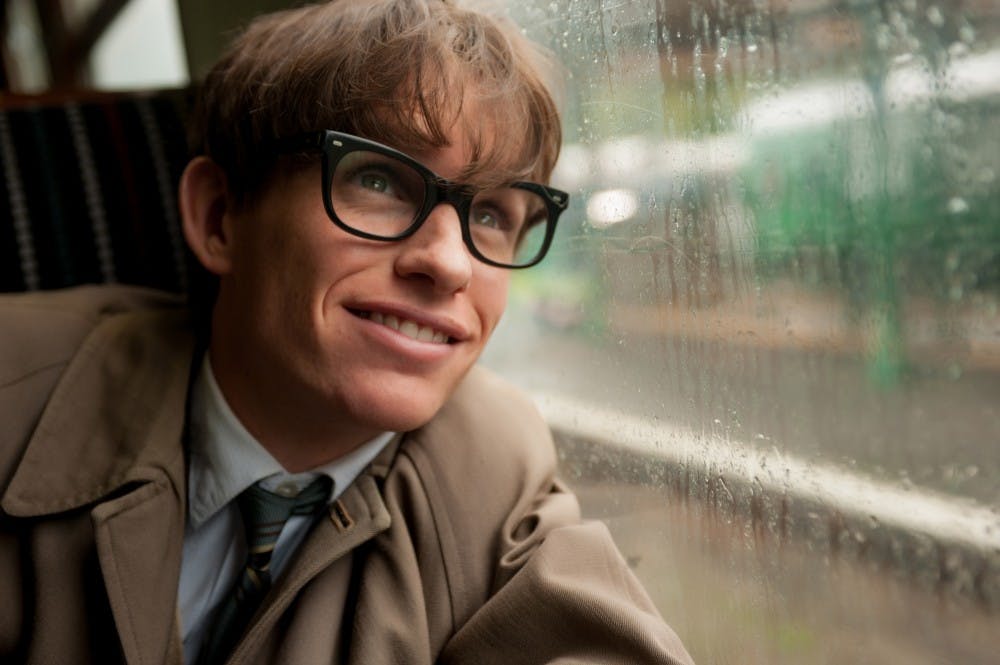Eddie Redmayne has gathered serious Oscar buzz for his portrayal of Stephen Hawking in “The Theory of Everything.” The budding star sat down with The Eagle’s Tam Sackman to discuss playing such an encompassing and difficult role.
Eagle: How did you physically prepare for such a demanding role?
Eddie Redmayne: I started, basically, the day after I was cast. I went to an ALS clinic in London and I met with a specialist there. She educated me on the disease, but she also introduced me to people, maybe 30 or 40 people suffering from the disease at various different stages and their families. And they were incredibly generous. Some of them allowed me to go to their homes so I could really see the emotional impact as well as the physical impact of the disease. It was then about tracing, tracking what Stephen’s specific decline could have been, much like photographs to the specialists. Then I worked with a dancer. I had to try and train my muscles. Because when you’re shooting, obviously you’re doing it again and again and again. So it’s about learning to sustain those physicalities without sustaining injury.
E: What are the challenges of playing someone who is not only real, but also still alive?
ER: Ah! There were so many. Ultimately the biggest challenge is just knowing that he’s going to see it. And that he and Jane and Jonathan and children were going to be the ultimate viewers. So great is the stakes, and it just galvanizes you to work as hard as you possibly can. And to be as true as you can and to be as educated and detailed as you can. Charlie Cox, who plays Jonathan and is an old friend of mine, said [after I got the part] the great thing about getting to play someone as extraordinary as Stephen Hawking is you have no option but to give it your everything. So in some ways it just really galvanizes you to work hard.
E: What’s the most fascinating aspect of Hawking’s work for you?
ER: I suppose all of the specifics. I mean, Hawking radiation is the most confounding discovery. But what I found most riveting was the idea of this world of great scientists. That they will present a paper in Cambridge that will then be reacted to by the presentation of a paper in Russia that is then responded to by a paper at [Massachusetts Institute of Technology]. This huge, gigantic chess game that is played across the world. I love the idea that everyone is battling for truths, that they will find something and then realize a few years later they’ve got it wrong. It’s a nebulous thing. It’s always moving and changing. That was interesting to me.
E: A lot of critics are saying that this is the role that is going to launch you into star territory. Where do you see your career going from here?
ER: It’s so lovely that people are being generous about it but you can’t—you just try to put one foot in front of the other. I was lucky enough that as a kid. I loved acting in school plays. And somehow I’ve been allowed to do it as a job. But each step of the way, you just try to retain employment. You try to tell stories you’re interested in telling. You can’t think in terms of anything else.
E: Where would you like to see your career going from here?
ER: Genuinely, it’s to keep doing that—to keep telling interesting stories. You are aware that if films do well financially you get a little more choice, but there’s never been a part that I’ve wanted to play or a specific role. I never would have dreamed that I would have the opportunity or be able to play Stephen Hawking. It’s only when a script arrives and you’ve got to fight for it and you’re like ‘oh god, now I’ve actually got to do it!’ You keep sort of pushing yourself.
E: How are you able to speak entirely through facial movements, especially in the more humorous moments when he wasn’t even physically capable of talking?
ER: That side of it was about getting as much documentary as possible and putting it on an iPad, sitting in front of a mirror, making sure that nobody was around, trying to replicate, trying to activate the muscles that Stephen could use. As the disease takes hold, all of the facilities that we have of gesture and of tone of voice and of energy—it’s like all of those things get channeled into the few muscles that he does have left. It’s almost like he uses these muscles here that I’ve never used before. You have to learn to activate them in order to find that expression because you use what you can. There were various things to make shortcuts; because it took a while to spell, he would use his eyebrows.
His mom always said that he had very expressive eyebrows and that was helpful as the illness kicked in. There was that side of it and then there was the fact that, for example, to say yes or no, the shorthand at about the point that I was playing him at the end, he would use a smile as yes and a slight sort of grimace as no. Learning all of those things was literally about being in front of a mirror and trying to learn.
E: Is there a deeper appreciation for, or perhaps a residual guilt, that stems from being able to return to an able body once filming is over?
ER: Absolutely. I think the other thing was particularly meeting so many people who are suffering from ALS. They were so generous. They would do things for me—I could feel their hands, feel their muscles and get a sense. And you were constantly aware but also observing, trying to be authentic as you could, but you didn’t want to feel in any way that you were overstepping a line. Part of the filming process, some of those scenes were uncomfortable. But, as you say, every day you were conscious that you could get up out of the wheelchair and having met these people, so many were unable to. It’s a really, horrifically brutal disease. But I hope that the reason they were so generous was if I could be authentic to what the illness was, then I could educate people about the illness and hopefully encourage people to put even more work into trying to find a cure.
“The Theory of Everything” (PG-13, 123 min) is now playing at Landmark E Street Cinema and Landmark Bethesda Row.





